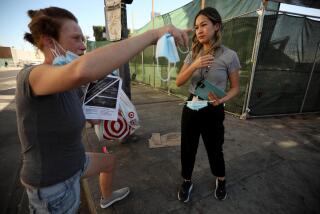Street Smarts : AIDS Educators Team With Prostitutes to Get Out Word on Safe Sex
- Share via
On the streets outside a girlie club in San Diego, the lights are just as bright and the parking lot dotted with just as many young sailors as in the good ol’ days.
You know, the days after The Pill paved a path toward easy sex and the Flower Children led the rest of the country down it.
Boisterous Groups
Standing in boisterous clusters outside the club, the fresh-faced recruits from the nearby Naval Training Center joke about their plans for this Friday night after a payday.
Then, into their midst strolls Tara, a smile on her face and plastic bags of condoms in her hands.
“Hello, boys,” she coos in her best call-girl tones. “Here. You need these for safe sex. Be sure to use ‘em and you’ll have more fun.”
A couple of the sailors look offended and refuse. An awkward silence follows as others consider what to do. Then, a newcomer joins the group, sees Tara’s offerings, and shouts, “All right!”
The ice is broken. With cries of “Trick or treat!” the others reach out for the Zip-Loc bags of condoms, a lubricant, illustrated instructions, and business-card-size lists of unsafe sexual practices.
Thus has one San Diego prostitute thrown herself into the fight against AIDS, the sexually transmitted disease that had killed 35,051 Americans as of last Monday.
Tara’s curbside courses in safer sex are the latest twist in an effort by the San Diego AIDS Project to reach out to people who need to know about the disease.
Her work is part of an emerging nationwide phenomenon, according to Priscilla Alexander, a leader in the San Francisco-based prostitutes group COYOTE. Since last July, Alexander and other prostitution activists have used a $50,000 state grant to fund a prostitute-to-prostitute AIDS program in San Francisco called the California Prostitutes Education Project.
Help in Finding Prostitutes
Alexander said she has begun to get calls from private and public AIDS educators all over the country, asking for help in finding prostitutes who will help combat AIDS. Efforts that don’t follow that trend will fail, she predicted.
“Those of us who are not prostitutes don’t know what the business is about, and our stereotypes would get in the way,” Alexander said. “If you’ve actually done the business, you know all the good, bad and indifferent things about it.”
The San Diego AIDS Project’s street education program is aimed at a variety of groups: gays in pickup bars or cruising beaches and parks, the homeless, poor or migrant Latinos, and now--with Tara’s help--prostitutes and their potential customers. Working at night, the street educators have handed out about 1,200 safer-sex packets a month since December.
Besides targeting gays, the educators
seek to reach those other at-risk groups while AIDS prevalence among them is much lower than in Eastern cities.
“We’re trying to heighten their awareness before it becomes a problem,” said Bill Moulton, an AIDS Project worker who accompanies Tara. “Infection among non-gay groups is already a major problem along the New York-New Jersey corridor. In the past, we’ve been about two years behind them. So if we can head off some of it now, then we’re saving ourselves some major problems a couple of years from now.”
Acquired immune deficiency syndrome is a fatal disease that destroys the body’s infection-fighting immune system. It is caused by the human immunodeficiency virus, or HIV, which enters the body through sexual intercourse or blood contact. Condoms are recommended as a way to prevent contact with infected body fluids during sex.
So far, AIDS in San Diego County has remained largely a disease of male homosexuals; 89% of the 844 cases diagnosed here have been among gays. Even intravenous drug abusers, the group through which AIDS is racing in the East, show a relatively low 3% infection rate in San Diego County.
Concern for ‘Sisters’
Tara--not her real name--said she volunteered in April to help educate prostitutes because of concern about her “sisters” who work the streets. She did so at the suggestion of Coyote’s Alexander.
A call girl who works out of her home, Tara speaks knowledgeably about HIV and research on it.
She is definite in the belief that prostitutes have more to fear from paid sexual encounters than do their customers.
“You know, it isn’t true that prostitutes have any more AIDS than the general population of women, unless they’re intravenous drug users,” Tara said. “I’m doing this more to protect the women because it’s easier for women to catch it than men.”
A study last year by the U.S. Centers for Disease Control, based in Atlanta, found that the rate of HIV infection among prostitutes is as high as 57% in some Eastern cities and averages about 11% nationwide. In Los Angeles, the infection rate was found to be 4.3%. Most of the women contracted the disease because of drug use, the study found.
It also found that prostitutes use condoms about half the time in their work. The study’s chief scientist suggested that persuading them to always use condoms would help prevent the virus from spreading further.
For Tara, condoms are a routine part of doing business--though she specializes in customers who prefer unconventional sex acts that do not include intercourse.
“Everyone I know insists that their clients use them,” she said. “I haven’t run into a client in about two years that would even ask not to use them.
“I give my clients the literature. If they express any concern, or if they say something that is really unwise, or they propose doing something that isn’t safe, then I tell them. They’re grateful for the information.”
On that recent Friday night, the young men Tara approached showed varying degrees of receptiveness to the educational message she and Moulton offered.
It quickly became apparent, however, that she would get better results than Moulton. Surly glares greeted his first effort to give away the condoms.
“I’ll talk to them; they can’t beat me up,” Tara decided.
Hardly.
“Show me where to use them,” one tipsy target said as he peered at the condoms, then lurched to put his arms around her.
“No, I don’t help with that,” she said, dodging.
Walking toward the next sex shop, just off Rosecrans Street, Tara explained that she deliberately isn’t using the term AIDS. “I thought that might scare people,” she said.
Her next approach retained its flirtatious core, but took on a motherly tone. “I used to teach school,” she confided later. “It’s the same approach: ‘Now, children . . . ‘ “
One young sailor refused the safer-sex packet, explaining: “Oh, it’s all right. I’m married.”
Then came the only negative encounter, a man coming out of a sex shop with a woman. “No, I’m safe enough!” he growled.
“He looked mad. Why do people get mad?” Tara asked, then thought about it and laughed. “I think I’d be mad if someone walked up to give me some condoms. I’d be furious--’What do you take me for?’ ”
Their shopping bag full of condoms exhausted, Tara and Moulton headed for the car. Their next task was to find prostitutes. Hookers generally are grateful for the information but sometimes get angry, they said.
But a cruise through downtown San Diego yielded only one possibility: a woman walking alone along a dark street.
Moulton turned the corner, parked quickly and grabbed several packets to give her. But he was back soon.
“She was gone already,” he said. “She’s popular.”
All told, it took him perhaps 30 seconds after noticing the woman to reach where she had been walking.
So the two mobile professors decided to dismiss class for the night.
“I think it was a productive evening,” Moulton said. “That worked out really well.”
Tara had handed out about 300 condoms.
“It sort of makes you feel like maybe you’ve helped somebody,” she said. “Someone who didn’t have any and would have taken a chance.”
More to Read
Sign up for Essential California
The most important California stories and recommendations in your inbox every morning.
You may occasionally receive promotional content from the Los Angeles Times.













